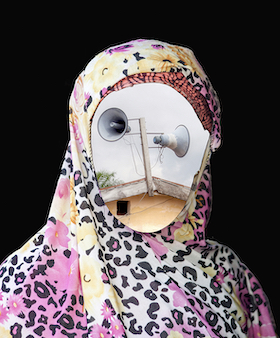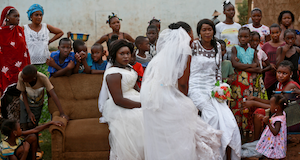
In conjunction with Musow Ka Touma Sera
Musow Kumkan (Women’s Voice)
Saturday, December 7, 2019, 3:45 pm
Lycée Ba Aminata Diallo, Medina Koura, Bamako, Mali
According to the international organization, UN Women, 35% of women in Mali have experienced sexual violence. In addition to this high rate, Malian women are further violated by an unspoken cultural norm called sutura, a tradition that psychologically grooms women and girls to conceal, forgive, and bear their sufferings in order to avoid a culturally-construed sense of shame.
Renowned Malian performing artist, Fatoumata Bagayoko, has designed a dance performance workshop titled Musow Kumkan (Women’s Voice) for Musow Ka Touma Sera, an exhibition of six Malian photographers whose work examines the tradition of sutura. The workshop seeks to provide a safe space to share thoughts on sexual violence and encourages participants to speak out and understand the impact of words on individual actions and the collective achievement. Spoken words will be translated into a series of individual movements and a final group choreography. The workshop aims to help participants find a renewed sense of self-confidence through voice and body.
Everyone is welcome to participate. Please dress comfortably. Refreshments will be provided, but bring your own water as a reserve.
The performance will be accompanied by a live band with traditional Malian instruments.
Selon l'organisation internationale ONU Femmes, 35% des femmes au Mali ont été victimes de violences sexuelles. En plus de ce taux élevé, les femmes maliennes sont violées une seconde fois par une norme culturelle tacite appelée sutura qui prépare psychologiquement les femmes et les filles à dissimuler, pardonner et supporter leurs souffrances afin d'éviter un sentiment de honte.
La réputée artiste de scène malienne, Fatoumata Bagayoko, a créé un atelier intitulé Musow Kumkan (La voix des femmes) pour Musow Ka Touma Sera, une exposition de six photographes maliennes dont le travail examine la sutura. L'atelier encourage les participants à s’exprimer et à comprendre l'impact des mots sur les actions individuelles et la réalisation collective en ouvrant un espace de partage sur la violence sexuelle, en transformant ces échanges en série de mouvements individuels et finalement en utilisant ces mouvements pour créer une chorégraphie de groupe sur laquelle les participants pourront exercer le lâcher-prise. L'atelier vise à aider les participants à retrouver un sentiment renouvelé de confiance en soit par l’usage de la voix et du corps et sera accompagné d'un groupe de percussionnistes maliens.
Tout le monde peut participer. Tenue confortable conseillée. Des rafraîchissements seront fournis, mais apportez votre propre eau comme réserve.
Like many children, Fatoumata Bagayoko danced for traditional ceremonies in her neighborhood. While originally she pursued a technical degree in electricity, her desire for an artistic career eventually took her to the National Institute of Arts in Bamako. After graduating, she entered the Balla Fasseke Kouyate Conservatory of Arts and Multimedia in Bamako, and obtained a 5-year program diploma with a specialty in dance. During this time, she received training in traditional dance with Karim Togola and Kardjigue Laico Traore as well as with internationally recognized dancers and choreographers: Opiyo Okach, Pierre Doussaint, Serge Aime Coulibaly, Reggie Wilson, Gregory Maqoma, Herman Diephuis, to name a few. Bagayoko's solo Fatou t'as tout fait (Fatou tried it all) was first presented at the festival Dense Bamako Danse in November 2015 where she received 1st Prize from the Foundation Orange, Mali. The piece also won 1st prize at the Bobo Dialasso competition Simply the Best Africa, 2016 (Ankata/Serge-Aime Coulibaly) and the ZBK Acknowledgment Prize 2017 at Zurcher Theater Spektakel in Zurich. Bagayoko heads a dance company called Jiriladon and in addition to her choreographic work, she has been teaching dance to the girls in her neighborhood for several years. She also leads the project Kene Koura (New Space) dedicated to teaching dance to girls. In life and in her work, Fatoumata brings her art to protest violence against women.
Comme beaucoup d’enfants, Fatoumata Bagayoko danse lors de cérémonies traditionnelles dans son quartier. D’abord orientée vers un C.A.P. en électricité, son désir de carrière artistique la pousse à entrer à l’Institut National des Arts de Bamako. Elle intègre ensuite le cursus de cinq ans du Conservatoire des Arts et Métiers Multimédia Balla Fasséké Kouyaté de Bamako et y obtient un Diplôme d'Études Supérieures Spécialisées en Danse. Elle se forme également en danse traditionnelle avec Karim Togola et Kardjigué Laico Traoré ainsi que d’autres danseurs de renommées internationales tels que Opiyo Okach, Pierre Doussaint, Serge Aime Coulibaly, Reggie Wilson, Gregory Maqoma ou Herman Diephuis. Son solo Fatou t’as tout fait est présenté pour la première fois au Festival Dense Bamako Danse en novembre 2015 et la pièce y obtient le 1er prix de la Fondation Orange Mali. Le solo remporte également le 1er prix du concours Simply the Best Africa 2016 (Ankata / Serge Aime Coulibaly) et le ZKB Acknowledgement Prize 2017 au Zürcher Theater Spektakel en Suisse. Dans cette performance en rouge et noir, Fatoumata confie la douleur et la peur de l'excision et donne une voix à l'immense fureur du dommage irréparable subi par les jeunes filles au nom d'une tradition patriarcale. Elle élève sa voix et livre une performance impressionnante et courageuse. Parallèlement à ses activités de danseuse et chorégraphe, Fatoumata mène des actions d'éducation artistique au sein de l'association Jiriladon qu'elle préside. Elle mène également le projet Kene Koura (Nouvel Espace) dédié à la formation des jeunes filles en danse. Fatoumata met son art au service de la lutte contre les violences faites aux femmes. Elle prend la parole pour raconter son histoire et celle de nombreuses autres femmes.



